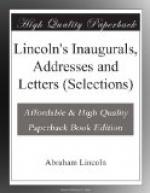The other addresses of the presidential period are, with the exception of the last speech, on the reconstruction of Louisiana, of minor importance. They consist in the main of responses to serenades, a form of address which Lincoln cordially detested and in which as a rule he achieved only a moderate degree of success. The cares of his great office made such cruel demands upon his time and strength that he declined many requests to speak in public, and whenever he did appear he confined his remarks within the smallest possible limits. Furthermore, Lincoln was not a reader speaker and rarely did himself justice without careful preparation. Writers on Lincoln have failed to note the severe criticisms upon Lincoln’s impromptu remarks that appeared in the opposition press and in the English newspapers. Even as late as 1863 newspaper writers not opposed to him did not hesitate to refer to the plainness of the President’s public speaking.
The Messages to Congress are distinguished from most documents of that class by their frequent purple patches. To the enumeration of dry facts furnished by the various departments they add an elevation and breadth of thought of the first order.
In a class by themselves are the various proclamations, some of them of a purely formal character, such as those announcing blockades, others of a distinctly literary character, like the announcements of fasts and feasts. Midway between these two classes is the most important of all, the Emancipation Proclamation of January 1, 1863, which, with the exception of the concluding sentence, is entirely free from ornament. Perhaps Lincoln felt here, as with the Debates, that the occasion was too serious, not only for jesting but even for attempting the mere graces of language.
Finally, mention should be made of the letters and telegrams written by President Lincoln. Although many letters have been preserved from earlier times, none make special claims to attention outside of the information that they furnish. But during the last four years of his life Lincoln wrote some of the most beautiful letters that have ever been composed. One of these, the letter to Mrs. Bixby, has been given a place on the walls of one of the Oxford colleges, as a model of noble English. The Conkling letter and the letter to Horace Greeley are among the most important statements of Lincoln’s policy and are really short political tracts.
The First Inaugural can be traced through the Cooper Union Address and the Lincoln-Douglas Debates, the Peoria Speech, and the speeches of 1854 to the seed of 1832, the plain, logical, direct statement of principles of Lincoln’s first address to the public. The development of the Gettysburg Address and the Second Inaugural, those supreme expressions of Lincoln’s feelings, is not, in the main, to be traced through complete speeches, but it must be sought for in isolated passages, when he left logic for the moment and gave




